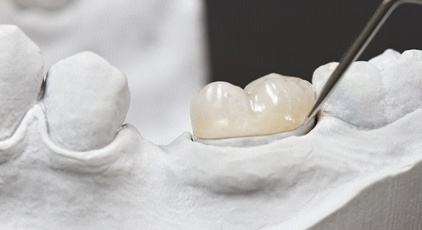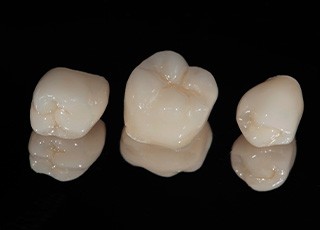Dental Crowns – Kernersville, NC
A Reliable Solution for Damaged or Decayed Teeth

There are many reasons why teeth become damaged or decayed. Maybe you accidentally tripped and fell while walking on the sidewalk or merely have poor oral hygiene. Whatever the case is, it’s incredibly important to protect the affected tooth and restore its strength. Otherwise, the damage or decay could leave your tooth susceptible to severe oral health issues and increase your risk of needing more invasive dental work down the line. Luckily, Dr. Walker offers high-quality, custom-made dental crowns in Kernersville to help strengthen and protect your smile. If you’d like to learn more about this solution, continue reading or contact our office and make an appointment today!
What is a Dental Crown?

A dental crown is a restoration that’s designed to cover the entire visible portion of a single tooth. It helps restore to tooth’s natural look and function while also preserving what’s left of the natural structure underneath. The restoration is ideal for patients with a tooth that has:
- A large cavity that can’t be treated by a filling
- Suffered a severe injury
- Become weakened and needs additional support to prevent fracturing
- A serious cosmetic imperfection that you want to fix
- Just received root canal therapy
The Process of Getting a Dental Crown

In most cases, the process of getting a dental crown takes place over several appointments. First, you’ll have a consultation with Dr. Walker where he’ll conduct an oral examination to determine whether or not the restoration can address your issues. If you’re eligible for a dental crown, he’ll explain the entire process before moving forward with treatment.
To prepare your tooth for the dental crown, Dr. Walker will need to reshape it by shaving off a thin layer of enamel. He’ll create just enough space for the restoration to lay flush with your remaining teeth once it’s secured. Once that step is completed, he’ll get an impression of your tooth and send it off to the laboratory so they can create your permanent dental crown. In the meantime, you’ll have a temporary crown in place to protect your prepared tooth.
As soon as we receive your permanent crown, we’ll call you back into our office, remove your temporary restoration, and replace it with your final one. Before you leave the clinic, we’ll provide you with aftercare instructions and explain how to properly care for the crown so you can enjoy it for many years!
The Benefits of Getting a Dental Crown

Repairing your teeth with dental crowns in Kernersville will allow you to enjoy a wide range of benefits, including:
- Improved comfort and chewing ability
- Lower risk of severe dental problems down the line
- Protection for natural teeth to keep them from needing extraction
- Ability to correct several oral health issues at once
- Lifespan of over 15 years with proper care and maintenance
- Natural-looking results
Do you think your smile could benefit from getting dental crowns in Kernersville? Contact our office and schedule a consultation with Dr. Walker today!
Understanding the Cost of Dental Crowns

It can be easy to assume that all dental crowns come with the same price tag, but the truth of the matter is that there are several factors that can affect the overall cost of the treatment. Naturally, we will take the time to make sure that you fully understand the financial side of getting a crown; this means providing you with a reliable estimate of the cost as well as explaining your options for payment.
Factors That Affect the Cost of Dental Crowns

One of the variables that can influence the cost of dental crowns is the material used to make them. Bear in mind that the least expensive option isn’t always the best. In many cases, cheaper materials result in a restoration that doesn’t last as long. Investing in higher-quality materials can go a long way toward helping you get more years of use out of your crown.
Another factor that needs to be taken into account is the severity of your dental damage. If multiple teeth are cracked or otherwise injured, you may need to pay for multiple crowns in order to repair all of them.
Finally, depending on the reason you’re having a dental crown placed, you may need to account for the cost of additional services. For example, it’s often necessary to place a crown after a root canal treatment in order to strengthen and protect the tooth in question. Naturally, root canal treatments have their own price tags to consider.
Does Dental Insurance Cover Dental Crowns?

As long as a dental crown is considered medically necessary, you can typically expect your dental insurance company to help pay for it. Many insurance plans will offer around 50% coverage for dental crown placement since it is generally considered a major restorative procedure.
It’s important to bear in mind that not all dental insurance plans are the same. You should take the time to review your benefits to make sure that you understand what services are and are not covered. Also, you should take note of any details of your plan that could affect the amount you need to pay out of your own pocket. For example, many insurance companies require you to meet a deductible before they start paying for any treatments.
Options for Making Dental Crowns Affordable

Are you worried that paying the full cost of a dental crown could put a strain on your bank account? If so, it may be worth looking into financing from CareCredit. With this option, you’ll be able to pick a payment plan that suits your budget and comes with little or no interest to worry about. You can talk to our team to learn more about how CareCredit works at our office as well as how you can apply for it.
Dental Crown FAQs

How Long Do Dental Crowns Last?
On average, you can expect your dental crown to last anywhere between 5 and 15 years. However, this varies depending on the material that the crown is made from. Metal crowns generally have a longer life span, but this isn’t always the case. The longevity of your crown will mostly rely on individual factors, like your diet, oral hygiene, and bad habits. Crowns that are on the front teeth could end up lasting slightly longer than crowns on molars, as they aren’t subjected to as much wear and tear from chewing.
How Do You Know When a Dental Crown Needs to Be Replaced?
The only way to know for sure if a crown needs to be replaced is to have it examined by a dentist. However, certain warning signs could indicate that you need a new one. Here are the most prominent:
- Pain: If your tooth is decayed beneath the tooth and causing pain, your crown should be removed and the tooth needs to be treated.
Looseness: If your crown feels loose, you should give us a call. - Change in Appearance: If your crown is chipped or discolored, it can negatively affect a patient’s self-confidence. This is a valid reason to have it replaced.
- Dark Line: If there is a dark line at the base of your crown, this could mean that the crown has been through some wear and tear.
Do Dental Crowns Feel Natural?
Within a few days of receiving your permanent crown, it should start to feel more and more natural. Crowns are made from durable materials that can stand up to everyday chewing forces just like your natural teeth. Each crown is custom-made based on impressions taken of your mouth, so it should fit in perfectly. The crowned tooth may feel slightly different from your other teeth when you first get it, but you will quickly get used to it.
Are Dental Crowns Covered by Insurance?
Every dental insurance plan differs, but most consider dental crowns to be a major procedure, so they cover about half of the treatment once you have met your deductible. Dental insurance will typically only cover crowns if they are deemed to be medically necessary, so if you are getting one solely for cosmetic reasons, you may not receive coverage.
